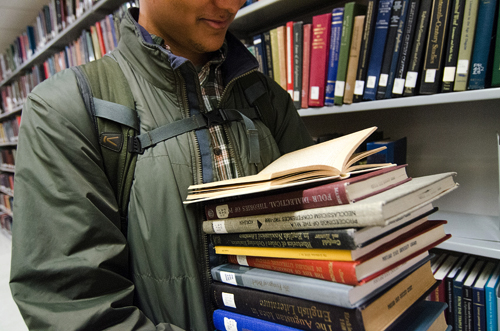It’s that time to start stressing about the end of the term, and for students who are heading into three weeks of projects, prep and performance evaluation, the only savior is the study break. Instead of spending your free hours binging on House of Cards or Dexter reruns, consider leaving an afternoon open for a different kind of light entertainment.
The write stuff

It’s that time to start stressing about the end of the term, and for students who are heading into three weeks of projects, prep and performance evaluation, the only savior is the study break.
Instead of spending your free hours binging on House of Cards or Dexter reruns, consider leaving an afternoon open for a different kind of light entertainment.
Everybody Reads, a community reading project by Multnomah County Library, is collaborating with Portland State to present its Short Story Contest Award Ceremony and Reception next Monday at the Native American Student and Community Center on campus.
Jeremy Graybill, the library’s marketing and communications director, appreciates the support from the university.
“PSU has been an Everybody Reads partner since 2006,” Graybill said. “Prior to that we sourced all the scholarly programs, lectures, et cetera, on our own. It was a lot of work.
“For us, [the collaboration] helped with the workload of having to create all that programming,” Graybill said. “The faculty at PSU have all the great expertise and come up with such good, interesting programming.
“It has been a great partnership,” he added. “PSU has added a fantastic new dimension to Everybody Reads. PSU faculty and students have also been very involved with cross-promotion and even creating thoughtful blogs about previous year’s authors and events.”
Being the bookish city that it is, Portland attracts writers from all over the country, and PSU is a campus with a number of skilled student and staff writers. The city and the school are both visited regularly by high-profile writers.
Why the need for Everybody Reads?
“The program asks a very simple question and returns a basic, hopeful answer: What if everybody read the same book?” Graybill said. “We’d talk to each other about issues that matter, and we’d celebrate the power of books in creating a stronger community.”
Touching on a much larger concept, Everybody Reads is concerned with how we consume entertainment and how much enjoyment we derive from discussion and contemplation of these stories beyond the initial reading.
Everybody Reads’ driving idea—that if you build a network of readership and conversation, then the medium as a whole will be strengthened—is a powerful one.
Still, instant gratification is a difficult thing to ignore, and recreational reading must compete with television, music and film, all of which are quicker forms of entertainment with bigger audiences, especially among students.
Fact is, choosing that novel on the bedside table gives you a story to enjoy, but not in the talk-around-the-water-cooler way that other forms of entertainment offer an audience who has watched or listened to the same thing: a communal work they can share.
“That’s the goal,” Graybill said. “To use literature and shared experience to create new opportunities for growth, knowledge and excitement for reading.”
Now in its 11th year, Everybody Reads continues to promote the concept of community reading with events and discussions based on the work of that year’s selected author.
Short Story Contest Award Ceremony and Reception
Part of Everybody Reads
Native American Student and Community Center
710 SW Jackson St.
Monday, March 11, 5 p.m.
Free and open to the public
Multnomah County Library has selected Sherman Alexie as this year’s author and has created a program around his books The Absolutely True Story of a Part-Time Indian and Ten Little Indians, the latter of which is a collection of short stories.
Short stories seem to be discussed even less often than novels among college-aged readers, when it seems they would be the perfect solution to attention-span and convenience problems.
Great short stories are extremely satisfying and thought-provoking, and in cases like the “Curious Case of Benjamin Button,” a short story by F. Scott Fitzgerald, often work better to address high-concept plots with grace and subtlety than meandering epics with a few inspired monologues.
Countless authors have seen the need for short writing as a tool to illustrate moments clearly and concisely, eliciting intense emotion through focused storytelling.
Great short stories have the potential to produce thoughtful discussion, and those involved in Everybody Reads hope that their short story competition next week will do just that. In fact, the deadline for submitting stories has been pushed back to March 8 in hopes that more stories will be written and turned in.
“The short story competition is just an opportunity for people to share their writing,” said Felicia Arce, student program coordinator at the NASCC. “Other students get the chance to dance, sing [and] make art, and we wanted to open it up to writers as well.”
The upcoming event marks the first time the NASCC has put on a short story competition where winners will read from their work, and it leads into the center’s “Taste of Cultures” event that night.





